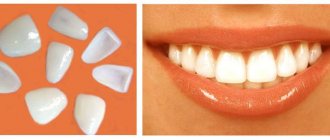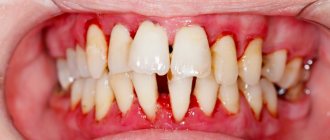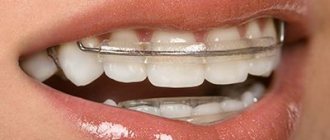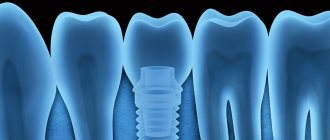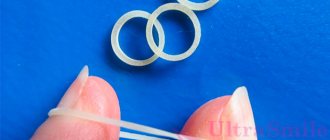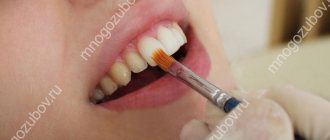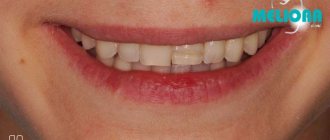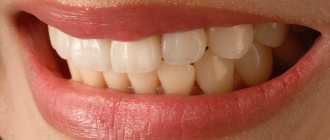Veneers are an innovation in modern dentistry, thanks to which a beautiful and dazzling smile has become accessible to every person! They are ultra-thin plates made from ceramics, porcelain, zirconium or composite materials, intended for veneering the facial surface of teeth. Veneers are characterized by increased durability and are resistant to various damages, so they perform not only an aesthetic, but also a protective function. Used to correct various dental defects, they are absolutely comfortable and do not interfere with normal human life.
The SmileDent implantation and dentistry center provides the service of installing veneers at an affordable cost. The procedure is performed by highly qualified aesthetic dentists using the latest hypoallergenic materials and modern equipment, which allows us to guarantee an impeccable result for each client!
Advantages of veneers compared to other methods
The installation of veneers is a very popular procedure in aesthetic dentistry, which is quite explained by the high corrective efficiency, versatility of use and the required low time expenditure for the entire cycle of the procedure.
The thinnest onlays for covering the surface of teeth, they have the following advantages in comparison with other types of restoration used in dentistry :
- Hypoallergenic – absolutely biocompatible materials are used to create and install veneers, which eliminates the risk of allergies;
- Durability - today veneers are one of the most reliable methods for restoring external dental defects, the service life of which can reach from 7 to 30 years, depending on the materials used;
- Resistance to plaque formation and staining - the materials used for the manufacture of onlays are resistant to the formation of various deposits, as well as discoloration due to exposure to coffee, juice, cigarette smoke, black tea, wine and other negative factors;
- Naturalness – the raw materials used for veneering teeth look very natural. In addition, our aesthetic dentist will do truly skillful work to preserve individual characteristics, natural shape, natural shade, surface and texture of artificial enamel, so that others will have no doubt that beautiful and straight teeth are your natural gift, and not the result of a dentist’s painstaking work;
- Painless – the process of preparing and installing veneers is completely comfortable for the patient and will not cause pain.
- Short time spent on correction of defects - with the help of veneers it is easy to correct some malocclusions, crooked teeth and other defects in a short period of time, whereas the correction of such defects using braces will take from 1 to 2 years.
Indications for installation of veneers
So, you have decided to get veneers. This means you need an initial consultation with a dentist and examination. During the examination, the doctor determines whether there are indications for installation . Indications include:
- dark color of tooth enamel
- cracks, chips in teeth
- gap between front teeth
- defects of the front teeth (curvatures, short teeth, worn down teeth)
It is important to remember that veneers are only installed on treated teeth. The absence of caries, tartar, and gum disease is the main condition for installing veneers.
Why are veneers needed?
Veneers are designed to give patients back their charming smiles. They help you forget about those individual characteristics that often become the reason for not accepting your appearance or a reason for frustration. For example, darkening of the enamel, too much distance between the front teeth, and lack of symmetry often lead to the fact that a person simply stops smiling. With the advent of veneers, such problems can be easily eliminated.
A separate chapter in the purpose of veneers is whitening. Often, onlays are used to instantly improve the shade of enamel without a long course and fulfill your long-standing dream of a perfect smile. A huge advantage of this method of achieving whiteness is the multiplicity of shades of onlays, which allows you to select them as accurately as possible in accordance with the color of the enamel of neighboring teeth.
As you know, no one is immune from darkening of teeth. Even the healthiest foods can contain natural coloring pigments. In addition, teeth often become darker with age. By installing veneers, the patient can forget about the need for whitening immediately after the procedure is completed.
Another reason that may lead a patient to undergo the described procedure may be tooth trauma or its destruction due to caries. Various chips, cracks in enamel, quickly erased enamel due to malocclusion - all this is not only aesthetically unattractive, but also affects the safety of teeth and the general condition of the oral cavity. In these and similar cases, veneers, in addition to masking, also have a protective function.
Types of veneers
Veneers are divided into composite (therapeutic) and orthopedic (indirect). They differ both in material and installation method, as well as in price, time and complexity of installation. Let’s figure out what the differences are between these types of veneers and in what case it is better to install them. Composite veneers are installed in one visit to the doctor. They are removed directly in the oral cavity using the direct method. The veneer material is similar to a filling, and the method of installation is similar to a filling. Initially, the dentist grinds down the front surface of the tooth, and then applies a light-curing material layer by layer. At the final stage, the veneer is ground and polished. Such veneers will last, like a regular filling, 5-7 years. The dentist will warn that composite veneers can still darken over time, so the patient is advised to minimize coloring foods.
If a composite veneer can be compared to a filling, then an orthopedic veneer can be compared to a crown. But the process of making a record is more complex and precise. This veneer is made from ceramic or zirconium dioxide. The process of installing it may resemble the process of installing a crown . Veneer installation is carried out by an orthopedic dentist in the following stages:
- Initially, the teeth on which veneers are ground down, removing a layer of up to 0.7 mm. The thickness of the layer depends on the shape and size of the tooth.
- Then impressions are taken of the ground teeth, from which veneers will be made.
- stage - fitting of finished records and color selection.
- the final stage is the installation or fixation of veneers with a special glue, which ensures a high degree of reliability of the adhesion of the veneer to the tooth.
Between the first and second stages 7-10 days pass. To prevent the patient from experiencing discomfort, the doctor will suggest temporary plastic veneers while the permanent ones are being made. Orthopedic veneers , thanks to the material and reliability of installation technology, will last 10-15 years and will be practically indistinguishable from natural teeth.
Installation of composite veneers
Veneers made from composite material are installed without removing the top enamel layer of the tooth. Since these products cannot withstand significant loads, they are used only to eliminate defects on the front teeth .
In most cases, the installation of a composite veneer is carried out during one visit to a specialist. The procedure for installing a composite microprosthesis includes steps such as: grinding the tooth surface to ensure better adhesion to the material, layer-by-layer application of the composite, and final grinding of the tooth.
Among the advantages of composite veneers are:
- do not require depulpation of healthy teeth, the enamel is processed only superficially;
- if necessary, veneers can be removed without negative consequences for the tooth;
- The procedure takes place in one visit;
- easily masks small defects;
- You can install a veneer on one tooth or on the entire row;
- do not feel like a foreign body, do not visually differ from natural teeth;
- have a low cost;
- You can choose any shade that best matches the patient’s remaining teeth.
At the same time, composite veneers also have disadvantages, including the following:
- It is impossible to completely eliminate tooth grinding;
- The final effect depends on the qualifications and experience of the dentist;
- Despite the strength of the material, it will not be able to withstand heavy loads, so it can only be installed on the front teeth;
- Under the influence of coloring substances in foods and drinks, as well as nicotine, the composite plate may change shade;
- The composite is subject to gradual wear and tear, and chips may appear along the edges;
- Short service period;
- If the installation is not careful enough, a space may form between the veneer and the tooth surface, which will ultimately lead to the proliferation of microbes in it and the development of diseases.
Price
The price of therapeutic veneers is comparable to dental treatment - the cost of the material plus the work of the dentist. The price of an orthopedic veneer is an order of magnitude higher and consists of both the cost of the material and the cost of manufacturing in the laboratory, as well as the work of the orthopedic dentist who installs the veneer. Advice: before installing orthopedic veneers, ask the doctor to show photos of his work before and after. In any case, when choosing the installation method and veneer material, be guided primarily by the recommendations of your treating dentist.
I wish you health and brilliant smiles!
Advantages of installing veneers at SmileDent
The SmileDent Implantation and Dentistry Center invites everyone to take advantage of all types of dental services at reasonable prices. By trusting us, you will choose:
- A staff of highly qualified dentists of various specializations;
- Use of advanced equipment, the latest hypoallergenic materials, safe types of anesthesia;
- Attentiveness and support of the patient at all stages of the treatment process;
- High level of customer focus;
- Possibility to make an appointment with a specialist any week;
- Affordable prices for all types of dental services offered.
Your health is our concern, and beautiful and healthy teeth significantly increase self-esteem and the chances of success for every person. Rest assured, with our help you will soon forget about your problems and become the owner of a spectacular Hollywood smile!
If this is your first time with us, you can sign up for a free consultation with any specialist by calling +7 or leave a request in the appointment form below, we will quickly call you back and make an appointment!
We will be glad to see you at our reception 
Frequently asked questions about veneers:
What problems can veneers correct?
Ceramic veneers mask chips, cracks in teeth, as well as their darkening or other discoloration, and close the gaps between them. Sometimes veneers are installed simply to make your smile a little more attractive.
Does installing veneers hurt?
No, installing veneers is a completely painless procedure. Before tooth enamel is removed, anesthesia is administered so you will not feel any pain or discomfort.
Will there be sensitivity after installing veneers?
Because veneers require the removal of a small portion of the enamel, the tooth may be sensitive for several days.
Can porcelain veneers change color?
No, ceramics do not change color over time. It is also worth noting that veneers are not amenable to whitening procedures.
Can veneers have caries?
Teeth with veneers, like regular teeth, can develop caries, but the veneers themselves cannot have caries. To prevent the development of tooth decay, you must brush and floss your teeth with veneers thoroughly and regularly, just like you would regular teeth.
What is the difference between a veneer and a crown?
Although a crown and veneer are usually made of the same material, they are used in very different ways. Veneers are intended for cosmetic purposes, while crowns are used to restore significantly damaged teeth. A veneer is a very thin piece of ceramic that is bonded only to the outer surface of the tooth. And the crown completely covers the entire circumference of the tooth at 360 degrees.
How long do veneers last?
It depends entirely on how well you take care of your mouth. With proper hygiene and care, veneers can last an average of 7 to 20 years.
Have you ever thought how good it would be to eliminate all the problems of your smile in just 3 steps? But this dream can become a reality if you use veneers. This wonderful technology is used by the lion's share of Hollywood stars, politicians, and media personalities. So what's stopping you from finally getting the smile of your dreams?
Microprosthetics involves the use of small prostheses (inlays, veneers in Krasnoyarsk), which are fixed in the oral cavity using fluid filling materials.
How is the procedure done?
First of all, the dentist examines and gives the patient advice about the condition of the teeth and recommended measures. Then it is necessary to carry out professional cleaning, cure caries and other diseases. It is strictly prohibited to install onlays on diseased teeth.
Installation of ceramic veneers requires preliminary grinding of the tooth, during which the top layer of enamel is removed. Then the doctor will take an impression of the tooth to send it to the laboratory to make a custom-made veneer that matches the shape and shade. At this time, to protect the tooth from exposure, the dentist installs a special laminate coating on its surface. After the onlay is ready, the doctor will glue it to the tooth using medical cement. All materials are biocompatible and do not cause allergies, rejection or other consequences.
As you can see, a healthy, attractive smile is real. We invite you to a free consultation at the Apex clinic, where you can learn everything about the condition of your teeth and oral cavity! Make an appointment by phone +7 (391) 211-51-55.
How much do veneers cost in Krasnoyarsk?
| Service name | price, rub. |
| Tooth restoration with inlays, veneer, half-crown (veneer based on “E-max” with application of mass) | 24000 |
| Tooth restoration with inlays, veneer, half-crown (zirconium dioxide-based veneer) | 24000 |
| Tooth restoration with inlays, veneer, half-crown (Cerec, Inlay – P.Shp) | 10000 |
| Tooth restoration with inlays, veneer, half-crown (Cerec, Onlay – P. Shp) | 12000 |
| Tooth restoration with inlays, veneer, half-crown (Cerec, end-inlay P.Shp) | 15000 |
| Tooth restoration with inlays, veneer, half-crown (Cerec, end-inlay “E-max”) | 17500 |
| Tooth restoration with inlays, veneer, half-crown (Cerec, “E-max” veneer) | 17500 |
Indications and contraindications for the use of veneers
Indications can safely include small defects in the dentition - chips, diastemas, protruding teeth. Teeth wear is also an important factor in the indications for veneers. Perhaps this is one of the main indications, because when using onlays in this case, they act as protection for your teeth.
The main contraindication for installing veneers is tooth depulpation, that is, removal of the neurovascular bundle of the tooth. The pulp provides the tooth with all the necessary minerals, fluoride and other substances. A pulpless tooth—a “dead tooth”—needs the delivery of substances from the outside, remineralization, and fluoridation. However, these procedures are extremely problematic to carry out under veneers, which has led to the emergence of such a condition for the use of veneers.
